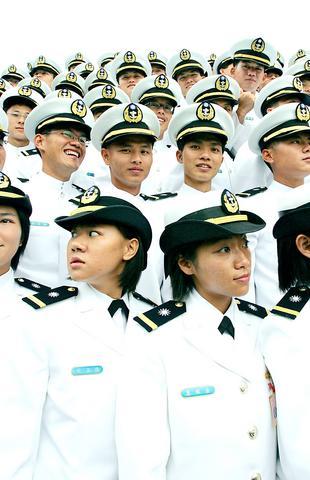Chinese President Hu Jintao (
Hu said Beijing wouldn't tolerate moves by the self-ruled nation toward formal independence and appealed to Washington to avoid sending the "wrong signal" to its government.
His comments came a day after his predecessor, Jiang Zemin (

PHOTO: REUTERS
Hu affirmed Beijing's promise to pursue peaceful unification with Taiwan, which has been autonomously ruled since 1949.
"But China shows no tolerance to the Taiwan independence," the official Xinhua News Agency paraphrased the Chinese president as telling Rice during a meeting at the Great Hall of the People, the seat of China's legislature. It said the country is "the key to sound and stable development" of US-Chinese relations.
Rice, who was on a three-nation Asian tour, visited Beijing to seek Chinese support for Washington's demand that North Korea give up nuclear weapons development, as well as other issues including Iraq.
Rice's talks in Beijing are "helpful for you to get a comprehensive understanding about ... our serious concern over the question of Taiwan," Hu told her.
Hu appealed to the administration of US President George W. Bush to avoid sending the "wrong signal" to Taiwan, Xinhua said.
China says it worries that US support is encouraging activists who want to make Taiwan's de facto independence permanent -- a step that Beijing says could lead to war.
Xinhua said Hu called on Washington to "honor its commitments" -- a reference to US pledges made in the 1980s that include a promise to reduce and eventually end arms sales to Taiwan.
US officials had no immediate comment on the talks yesterday.
On Thursday, Rice affirmed the "one-China policy," which doesn't support Taiwan independence, according to an official traveling with her, who spoke on condition of anonymity. The official said she repeated Bush's opposition to any unilateral change in Taiwan's status.

DAREDEVIL: Honnold said it had always been a dream of his to climb Taipei 101, while a Netflix producer said the skyscraper was ‘a real icon of this country’ US climber Alex Honnold yesterday took on Taiwan’s tallest building, becoming the first person to scale Taipei 101 without a rope, harness or safety net. Hundreds of spectators gathered at the base of the 101-story skyscraper to watch Honnold, 40, embark on his daredevil feat, which was also broadcast live on Netflix. Dressed in a red T-shirt and yellow custom-made climbing shoes, Honnold swiftly moved up the southeast face of the glass and steel building. At one point, he stepped onto a platform midway up to wave down at fans and onlookers who were taking photos. People watching from inside

MAKING WAVES: China’s maritime militia could become a nontraditional threat in war, clogging up shipping lanes to prevent US or Japanese intervention, a report said About 1,900 Chinese ships flying flags of convenience and fishing vessels that participated in China’s military exercises around Taiwan last month and in January last year have been listed for monitoring, Coast Guard Administration (CGA) Deputy Director-General Hsieh Ching-chin (謝慶欽) said yesterday. Following amendments to the Commercial Port Act (商港法) and the Law of Ships (船舶法) last month, the CGA can designate possible berthing areas or deny ports of call for vessels suspected of loitering around areas where undersea cables can be accessed, Oceans Affairs Council Minister Kuan Bi-ling (管碧玲) said. The list of suspected ships, originally 300, had risen to about

A Vietnamese migrant worker yesterday won NT$12 million (US$379,627) on a Lunar New Year scratch card in Kaohsiung as part of Taiwan Lottery Co’s (台灣彩券) “NT$12 Million Grand Fortune” (1200萬大吉利) game. The man was the first top-prize winner of the new game launched on Jan. 6 to mark the Lunar New Year. Three Vietnamese migrant workers visited a Taiwan Lottery shop on Xinyue Street in Kaohsiung’s Gangshan District (崗山), a store representative said. The player bought multiple tickets and, after winning nothing, held the final lottery ticket in one hand and rubbed the store’s statue of the Maitreya Buddha’s belly with the other,

Japan’s strategic alliance with the US would collapse if Tokyo were to turn away from a conflict in Taiwan, Japanese Prime Minister Sanae Takaichi said yesterday, but distanced herself from previous comments that suggested a possible military response in such an event. Takaichi expressed her latest views on a nationally broadcast TV program late on Monday, where an opposition party leader criticized her for igniting tensions with China with the earlier remarks. Ties between Japan and China have sunk to the worst level in years after Takaichi said in November that a hypothetical Chinese attack on Taiwan could bring about a Japanese